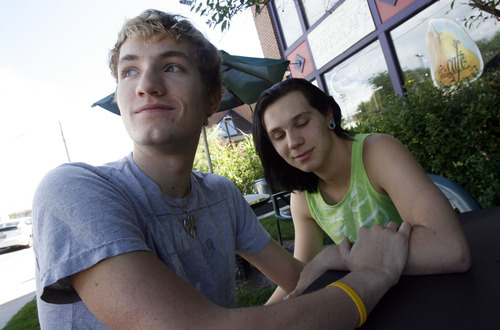This is an archived article that was published on sltrib.com in 2011, and information in the article may be outdated. It is provided only for personal research purposes and may not be reprinted.
The support network in Davis County for lesbian, gay, bisexual and transgender youth is sparse, making adolescence for some more difficult to navigate and survive.
Last October, McKay Tate dropped out of Davis High School, months shy of earning his diploma.
"Out of 2,600 students at that school, I was the only 'out' gay kid," Tate said. "After three months, I told my mom I wasn't going back."
While he was not bullied, Tate felt ostracized because of his sexual orientation.
"I had no friends there," Tate said.
His efforts to launch a Gay-Straight Alliance (GSA) club at the school fell flat because he lacked a teacher who would sign on as sponsor.
Tate went on to graduate from Horizonte, an alternative high school in Salt Lake City.
He also found social acceptance at TINT, the Utah Pride Center's gathering spot for teens ages 14 to 20. TINT stands for Tolerant Intelligent Network of Teens and serves as a safe haven for youth "that fall into the whole queer alphabet soup," Tate said.
"I consider it my second home," said Tate, now 19 and president of the regional officers who oversee the center's Queer Straight Alliance network.
The Davis School District currently has one GSA club, formed at Clearfield High School last year. Bountiful High School is trying to re-establish its GSA group, Tate said, and Layton High School should launch theirs this fall.
Across Utah, there are about 40 active GSA clubs, said Utah Pride Center spokeswoman Marina Gomberg.
"The LGBT issue has not been presented as a big issue in our district," said Student Services Director Brad Christensen. However, the district proactively opposes bullying, he said, and plans to establish a phone number that students can text from their cell phones to quickly report any incidents.
"It's difficult to confront a bully," Christensen said. "It's tough for a bystander to know where to go, and often kids don't know if adults will actually do anything."
That lack of "feeling safe" is a concern that Kathy Godwin and Allison Black routinely address. Godwin is president of Salt Lake City's chapter of Parents, Friends and Families of Lesbians and Gays (PFLAG), while Black heads up Ogden's PFLAG group. St. George is home to the state's third PFLAG chapter.
"When your sexual orientation may be different than all the friends, adults and family that you know," Godwin said, "it feels really scary."
According to the Family Acceptance Project, launched by Caitlin Ryan at San Francisco State University, gay and transgender young adults who feel highly rejected by parents and caregivers are more than eight times as likely to try to kill themselves, over six times as likely to suffer depression, and more than three times as prone to use illegal drugs and to contract a sexually transmitted disease.
"Safety is huge," Godwin said, noting she gets emails from teens hesitant to come out to their parents for fear they'll get kicked out of the house, sent to a counselor to change or severely restricted in what they're allowed to do.
Clearfield's GSA club provides an environment where students can identify with others, said Assistant Principal Ross Harris, and feel safe and connected through friendships and service.
Bountiful resident and PFLAG member Kris Cantril understands Tate's need to exit high school early. Her transgender daughter, now 28, dropped out of school six weeks before graduation.
"She couldn't take it any more. It was like going into the lion's den every day," Cantril said of the emotional and sometimes physical abuse her daughter suffered.
Cantril's message to other parents is to not bend to society's pressures.
"We need to allow our children to express themselves freely," Cantril said, "and we need to embrace that expression."
Kilo Zamora, executive director of the nonprofit Inclusion Center based on the Westminster College campus, said its role includes raising awareness of LGBT issues.
"There is a conservative perspective in Davis County," Zamora said. "The big question that has to be tackled is how to help people maintain their religious values and at the same time be respectful of the Queer-LGBT community."
Zamora praised Jackie Thompson, Davis's educational equity coordinator, for encouraging respect for all cultural groups, LGBT included.
And while progress has been made, Zamora believes a larger shift is needed, from tolerance to acceptance.
"We're trying to uproot homophobia as well as racism," Zamora said. "That can be hard, because it's so deep in our attitudes."
twitter: @catmck —
Davis County demographics
306,479 residents
90 percent are white
8.4 percent are Hispanic or Latino
1.2 percent are black
34 percent are under 18 years old
95 percent over 25 years old are high school graduates
33 percent over 25 years old have bachelor's degrees
79 percent own homes
Median household income is $66,220
7 percent live below the poverty level
Source: U.S. Census Quickfacts



